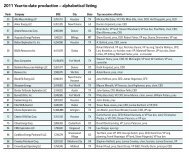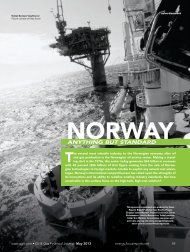Russia - Oil & Gas Financial Journal
Russia - Oil & Gas Financial Journal
Russia - Oil & Gas Financial Journal
Create successful ePaper yourself
Turn your PDF publications into a flip-book with our unique Google optimized e-Paper software.
Different Focuses – One Aim<br />
“<strong>Russia</strong> is currently the number one oil producer in the world. And of<br />
course expanding oil exports is of fundamental importance to us, since<br />
this is where our core budget revenues come from,” Deputy Prime Minister<br />
Igor Sechin recently stated. By keeping production levels at the end<br />
of 2009 above 10 million barrels, the country overtook Saudi Arabia to<br />
become the world’s biggest producer of oil.<br />
As well holding this enviable position, <strong>Russia</strong> also holds 32% of the<br />
globe’s proven gas reserves and is the largest exporter of gas. The<br />
global gas market in 2010 looks very different to a few years ago, due<br />
to the rising importance of shale gas in the US market and predicted<br />
slumps in global demand. <strong>Gas</strong> has always been indexed to oil prices,<br />
but gas prices stood at around U$ 4.6 per British thermal Unit (BTU)<br />
at the end of June 2010, twenty times less than the current oil price.<br />
Historically, it has always been closer to ten times less. Despite this situation,<br />
at the most recent meeting of the <strong>Gas</strong> Exporting Countries Forum,<br />
<strong>Russia</strong>n Energy Minister Sergey Shmatko stood against putting quotas<br />
on production, an alternative to indexation. “All ministers agreed and<br />
supported that we continue our efforts to achieve indexing gas to oil,”<br />
he said after the forum.<br />
New pipeline projects to extend and diversify <strong>Russia</strong>’s export reach<br />
are positioning the country in a new light: as a major supplier to Europe<br />
and the CIS through projects such as the Caspian Pipeline Consortium<br />
(CPC) Baltic Pipeline System (BPS), as well as gas through Nord Stream<br />
and South Stream. Valery Yazev, vice chairman of the State Duma, <strong>Russia</strong>’s<br />
equivalent of the United States House of Representatives, explains<br />
the need to develop such projects when there is already pipeline capacity<br />
to Europe. “By 2020 <strong>Russia</strong> will need to transport an additional<br />
100bcm of gas per year to Europe and that is what North Stream and<br />
South Stream are meant for. They are additional transport routes, which<br />
will diversify the transit system and reduce the dependence of <strong>Russia</strong><br />
and European countries on countries such as the Ukraine, which have<br />
caused transport problems in the past.”<br />
<strong>Oil</strong> and gas are clearly hugely important for the <strong>Russia</strong>n state budget.<br />
Although Finance Minister AlexeY Kudrin has been pushing for some<br />
time for “ending dependence on oil”, <strong>Russia</strong>’s 2009 budget was contingent<br />
on oil prices reaching U$ 95 per barrel. When this did not happen<br />
the country’s reserve fund built up during the boom years had to be<br />
used, which meant that oil and gas revenues accounted for 11% of GDP<br />
and half of the country’s spending for the year.<br />
The <strong>Russia</strong>n government is also looking at reshaping its oil and gas<br />
taxation system. The current system taxes upstream production but<br />
allows companies to make their money in refining and downstream<br />
activities, essentially fostering an environment where only <strong>Russia</strong>’s largest<br />
integrated players stand to benefit. A new taxation model would look<br />
to stimulate growth across the energy value chain and encourage the<br />
development of smaller oil and gas<br />
companies more suited to exploiting<br />
mature deposits in Western Siberia.<br />
Encouraging the development<br />
of junior companies in <strong>Russia</strong> has<br />
been an issue for the last few years,<br />
as Yuri Shafranik, former Minister of<br />
Fuel and Energy (1993-1996) and<br />
today chairman of the Union of <strong>Oil</strong><br />
& <strong>Gas</strong> Producers of <strong>Russia</strong> explains.<br />
Igor Sechin, Deputy Prime Minister “In 1996, 16% of <strong>Russia</strong>’s total production<br />
volume belonged to small<br />
and medium companies. Today, that<br />
percentage hardly reaches 2%. Small<br />
business today is burdened with tax.<br />
We realize this problem and our mission<br />
is to analyze the issue and try<br />
and persuade the Government and<br />
the State Duma that it is very important<br />
and that resolving it is in the<br />
national interest.”<br />
As well as addressing this issue<br />
AlexeY Kudrin, First Deputy Prime<br />
Minister and Minister of Finance and making sure that <strong>Russia</strong> capitalizes<br />
on fields that are not of strategic<br />
importance to the major players,<br />
any new taxation system must also<br />
encourage <strong>Russia</strong>n companies to<br />
exploit promising new regions such<br />
as East Siberia. The new taxation<br />
model must also acknowledge the<br />
current issue in convincing investors<br />
that moving to these new regions is<br />
worth the investment. This may take<br />
the form of a revenue-based tax system,<br />
or continued tax holidays for<br />
Valery Yazev, Vice Chairman of State<br />
Duma<br />
specific fields, but will have to take<br />
pains to maintain a balance between incentives for upstream and downstream<br />
operations.<br />
The energy sector as a whole has undergone some major changes<br />
over the last decade from commodity producers to consumer facing<br />
power generation companies. Yuri Lipatov, chairman of the State Duma<br />
Committee for Energy has overseen many of these changes, including<br />
the liberalisation of the power generation industry. He explains that in<br />
the end these changes should always be concerned with improving the<br />
experience of the end-user. “We hope that the philosophy of the law<br />
will, at the end of the day, form competitive pricing, which in turn will<br />
70 www.ogfj.com • <strong>Oil</strong> & <strong>Gas</strong> <strong>Financial</strong> <strong>Journal</strong> August 2010














